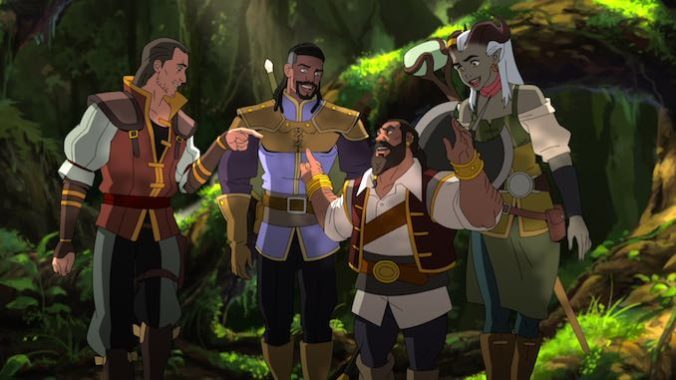Dragon Age Creative Director & Absolution Showrunner on the Series’ Future, Kirkwall Connections, and Canon Narratives
Photo Courtesy of Netflix
Bioware’s Dragon Age series is one of the most lore-rich fantasy RPGs out there. In addition to three engrossing games (Origins, Dragon Age 2, and Inquisition) and another one the way (Dreadwolf), the stories of the mythical continent of Thedas and its inhabitants have been told across comics, anthologies, novels, and more fan art that an AI could even consider making (not to mention fanfic). And with the animated Netflix series Absolution, Dragon Age has now come to TV as well.
In an email Q&A, Absolution Showrunner/EP Mairghread Scott and Dragon Age Creative Director John Epler shared a few insights about their plans for the series, its connection to the games (particularly Dragon Age 2), and what viewers should and shouldn’t take away from the storytelling regarding any “canon” narratives. And while we couldn’t talk about the upcoming Dreadwolf specifically, there was certainly plenty else to dive into—especially regarding Absolution’s surprising final moments.
Though Absolution has its own satisfying arc, it also ends in way that clearly sets up a second season (and perhaps beyond). In terms of plans for more, Scott noted “as a TV writer, I’ll take as many episodes and seasons as anyone will give me.” Of course, there’s always a lot of uncertainty surrounding Netflix’s plans for its series, many of which are cancelled after a single season. And that would be a big blow for Absolution in particular, which introduced us to a lovable group of rogues that—given the short episode order—we only got glimpses of beyond Miriam’s compelling main story.
“It was really important for me to make sure Season 1 was Miriam’s story first and foremost and she’ll still always be our lead,” Scott wrote. “But we’ve developed quite a crew of characters that a lot of fans (including the writers) care deeply about. Lacklon, Roland, and Qwydion have always had lives and stories of their own, and I’m very excited to tell them.” More specifically, she added “I’ll also throw out that I can’t wait to see how the Imperial Divine reacts to all of this. Tassia’s troubles are just starting on that front.”
Absolution feels like something of a trial balloon for the creation of more fantasy stories from Bioware’s creative arsenal beyond the games; if it proves popular enough, the series could continue to expand this world that has come to mean so much to the fandom. Though there are no plans that can be shared at the moment, “I think the way to look at all of our story content is that it’s all contributing to the rich narrative tapestry that is Thedas and that is Dragon Age,” Epler shared. “When we refer to the Dragon Age franchise, we’re not just talking about the core games—we’re talking about all of it, because it all works to build context and nuance and a richness to the world that you can’t really get to with just the games themselves.”
Still, Absolution does have a very close connection to one of the games: Dragon Age 2. In the concluding moments of the final episode, the show returns to Kirkwall, where we hear the voice of Knight Commander Meredith—supposedly defeated by the player character Hawke after Meredith was corrupted by a lyrium idol at the end of the game—scheming again against mages and, in particular, Tevinter. While we don’t know the exact timeline of this conversation (where Meredith seems to be speaking from within the idol itself), it’s a connection that fans were definitely not expecting. And it suggests a return to (as well as redemption for) a game that was unfairly maligned upon release, but which has since found vocal defenders.
“Dragon Age 2 was the first full game I ever created content for—I was in QA up ‘til then, and became a cinematic designer for that project—so even before Dragon Age 2 started getting its second wind, I’ve always had a special place for it in my heart,” Epler wrote. “Any time we get a chance to go back to Kirkwall, I love it, because I think Kirkwall, in many ways, embodies one of the most fundamental truths about Thedas (and in particular, Thedas during this particular Age) which is that bad things happen, a lot, and sometimes the best you can do is take care of the people close to you—and sometimes you can’t even do that.”
-

-

-

-

-

-

-

-

-

-

-

-

-

-

-

-

-

-

-

-

-

-

-

-

-

-

-

-

-

-

-

-

-

-

-

-

-

-

-

-








































